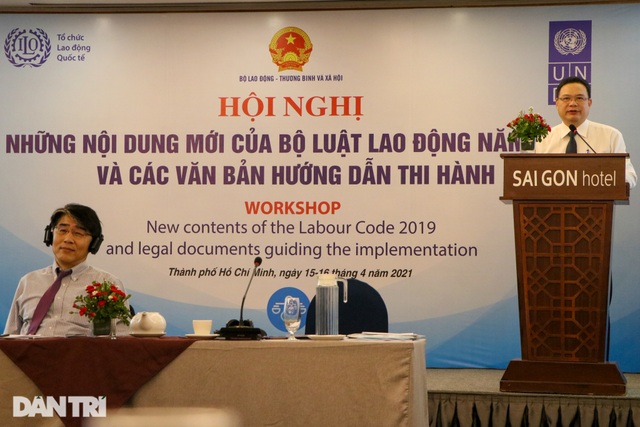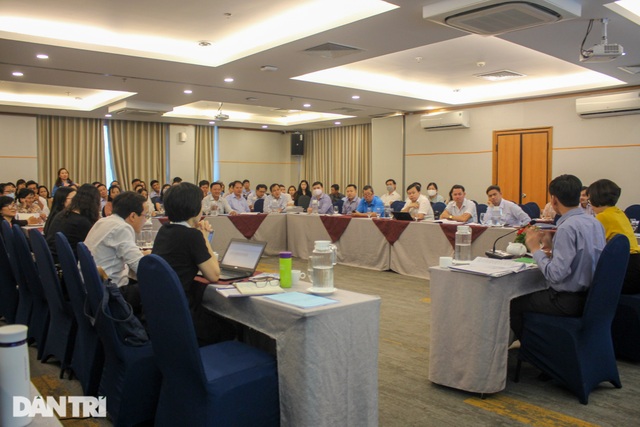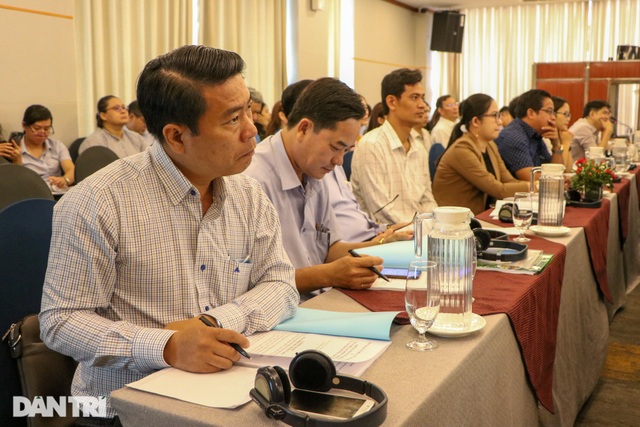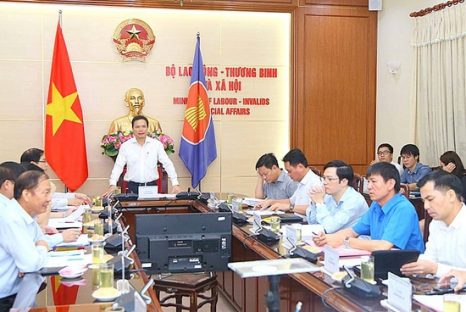Answer many questions about salary, working time, social insurance
The Conference on Labor Code 2019 was organized by the Ministry of Labour, Invalids and Social Affairs to answer questions about salary policy, employment, social insurance, working time, labor relations…

Nhấn để phóng to ảnh
Ngày 15 – 16/4, tại TPHCM, Bộ LĐ-TB&XH tổ chức Hội nghị phổ biến về Bộ Luật Lao động 2019.
On the morning of April 15, in Ho Chi Minh City, the Ministry of Labour, Invalids and Social Affairs held a conference to disseminate the 2019 Labor Code and its guiding documents to the Departments of Labour, Invalids and Social Affairs and businesses in the southern provinces.
The conference was attended by Deputy Minister of Labor, War Invalids and Social Affairs Le Van Thanh, along with representatives of the Departments of Labour, Invalids and Social Affairs of the southern provinces, the Industrial Park Management Boards of the provinces, the provincial labor unions, and many other organizations. related to the southern provinces.
Speaking at the opening of the Conference, Deputy Minister Le Van Thanh said that the Labor Code of 2019 passed by the National Assembly and took effect from January 1, 2021 has many major and important amendments and supplements in the field of labor law. Management of the labor market is growing and changing.

Nhấn để phóng to ảnh
Hàng trăm đại biểu tại các tỉnh thành phía Nam tham dự Hội nghị.
“The Labor Code of 2019 has appropriate amendments, approaching international labor standards, especially basic labor standards. In order to comply with international commitments, serving the process integration of Vietnam”, emphasized Deputy Minister Le Van Thanh.
The amendments are geared towards dialogue, negotiation and signing of collective labor agreements in order to improve working conditions, ensure jobs, and improve the spiritual life of employees.
“Dialogue and negotiation, signing of collective labor agreements is a central task, a need in itself, bringing practical benefits to union members and employees. Dialogue also creates the strength of the organization. trade unions, and at the same time contribute to promoting harmonious labor relations at enterprises,” said Deputy Minister Le Van Thanh.

Nhấn để phóng to ảnh
Thứ trưởng Lê Văn Thanh cho biết: “Sửa đổi chính sách để nâng cao đời sống người lao động”.
At the conference, a representative of the Legal Department (Ministry of Labour, Invalids and Social Affairs) implemented changes and new regulations of the Labor Code in 2019 and documents guiding the implementation of the Labor Code.
Specifically, major additions to the Labor Code on labor relations, management of foreign workers working in Vietnam and unemployment insurance policy in accordance with the Law on Employment and the implementation and promotion of gender equality in the Labor Code 2019; salary in the Labor Code 2019 and guiding documents…

Nhấn để phóng to ảnh
At the Conference, the delegates discussed and answered the problems and difficulties in the process of implementing the provisions of the labor law at the “enterprises” in the southern region.
A business representative at an industrial park in Bien Hoa 2 (Dong Nai) said that in reality, many workers still want to work continuously and do not take annual leave to have more money.
Therefore, when the Labor Law 2019 comes into effect, apart from the two cases of termination of labor contracts or loss of jobs, will no longer be paid for annual leave days, will it cause difficulties for employees?

Nhấn để phóng to ảnh
Đại biểu của Công đoàn Công nghiệp Đồng Nai thắc mắc về vấn đề người lao động tự ý bỏ việc thì doanh nghiệp có thể đòi bồi thường không?
Responding to the above question, Ms. Pham Thi Thanh Viet, Deputy Director of the Legal Department (Ministry of Labour, Invalids and Social Affairs) said that on the issue of annual leave, the Labor Law 2019 has 2 changes: the employer is responsible. Responsible for developing annual leave schedule.
The Labor Law 2019 also omits “other reasons” and the responsibility to pay annual leave is set out only in 2 cases: job termination and job loss. The goal of this adjustment is to encourage employees to use up their annual leave and regenerate their labor force.
On the part of the employer, it is the responsibility of the employer to develop an annual leave schedule including: specific dates and times, framework regulations, principles (for example, employees register to take leave except for peak days). When an employee applies for leave, the employer cannot refuse it.
At the same time, the Law also only states that an employee can agree to take annual leave or take a combined leave of up to 3 years/time, that is: The employee only has the right to negotiate and the employer can agree or are not.

Nhấn để phóng to ảnh
Bà Phạm Thị Thanh Việt, Phó vụ trưởng Vụ pháp chế (Bộ LĐ-TBXH) giải đáp các thắc mắc của đại biểu, khách mời.
Also at the conference, a representative of Dong Nai Industry Union asked, is it illegal for an employee to take 5 consecutive days off? If the enterprise only has the right to unilaterally terminate the labor contract without having the right to claim compensation or fine the notice period, it will lead to the employee leaving without reason, affecting production.
According to Ms. Pham Thi Thanh Viet, in the above case, the employee is not considered illegal unilaterally because there is no ground that the employee wishes to terminate the labor contract. It is necessary to determine whether the employee wishes to terminate the employment contract.
If it is determined that the employee wishes to terminate the labor contract, it means that the employee unilaterally violates the law, then the employer has the right to claim compensation.
If the employee has no desire to terminate the labor contract and does not fall under the case of “good cause”, the employer has only the right to dismiss or unilaterally terminate the contract with the employee…
Southern Thai – Xuan Hinh




